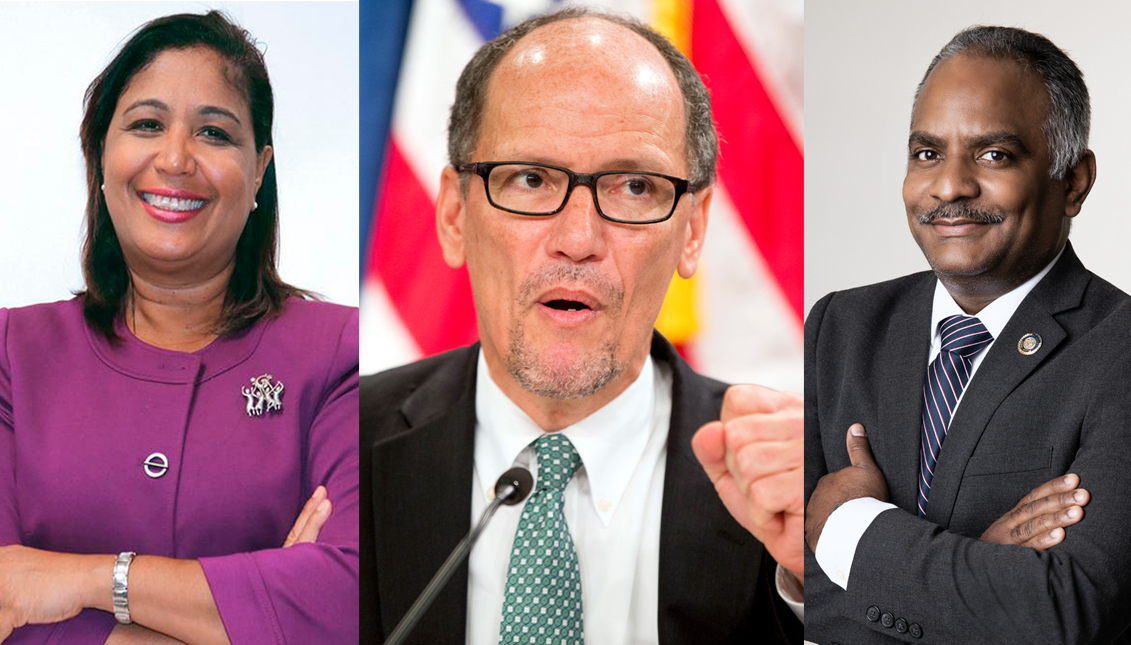
Latinos aren’t a number: Top leaders talk mobilizing PA’s Latinx vote
The Hispanic Caucus stopped in Pennsylvania Wednesday night for a discussion featuring DNC Chairman Tom Perez, Rep. Danilo Burgos, and Philadelphia City Councilwoman María Quiñones-Sánches.
It focused on getting Latinx voters out to vote, and making sure we all have a plan for Election Day, raising awareness of multiple resources at the community’s disposal.
“The most important thing we want to communicate is the necessity of making a plan and making a plan early,” Rep. Burgos said. “Most importantly, bring back respect to all of Latin America.”
Councilwoman Quiñones-Sánchez led the discussion, putting it plain and simple.
“Everybody that talks to me in the next 41 days, if they don’t have a plan to vote, they’ve got to tell me that first. Que tú vas hacer, y entonces hablamos,” she said.
Both leaders were recently appointed to Biden’s Pennsylvania Latino Leadership Committee, and welcomed Sen. Kamala Harris during her visit to Taller Puertorriqueño last week.
“We are very, very much committed to making sure that the Harris-Biden ticket sees the barrio, feels the barrio, and understands the stories behind the numbers because it’s not about the numbers. These are people’s lives that we’re impacting every single day,” Quiñones Sánchez said.
The fear of being a person rather than a number — Latinx communities have made this concern known to the Biden-Harris campaign for months. Does he view the demographic as a monolith? What is the ticket’s understanding of our deep nuances, if any?
According to Tom Perez, the linchpin of the Latino engagement strategy has been understanding that we are Latino communities — plural, and though we share many challenges in common, we also have unique ones.
“We share a language, but we have a wide array of life experiences from our country of origin that is really, really important,” Perez told AL DÍA, in an interview before the event.
And so, one of the things the campaign sought to do was increase organizing in its relationship with Latinx voters by improving voter information to diversify its outreach strategies.
“What that means is when I got here in 2016, if I met someone named ‘Perez’ and I saw their name in the voter file and they were from Philadelphia, I could have guessed where they were from,” said Perez.
But that would defeat the purpose — by jumping to a conclusion based on stereotypes and generalizations.
“And if you want to build the appropriate relationship and earn the votes of Latinos, you need to know, is ‘Perez’ Dominicano, Boricua, Mexicano? De donde es?” he continued.
That’s the question that must be asked, says Perez, because in places like Pennsylvania and Florida, the largest battleground states in the nation, there are a multitude of Latinx identities, spanning dozens of countries of origin.
“We’re having conversations with Cuban Americans on issues that are unique to them. We’re talking to Boricuas about this president’s utter failure in the aftermath of Maria. There are challenges that cut across the Latino community. This president’s failure on coronavirus has hurt all Latinos,” Perez said.
The unemployment rate, the economic collapse, specifically with focus to small business owners — has hurt all Latinx communities harder than the rest. Yes, there are the issues that separate one’s specific background from the other, but on issues like COVID-19, the demographic as a whole has been disproportionately affected.
At the same time, specifically the Puerto Rican community has perhaps suffered the longest running onslaught of disrespect since the Trump administration took office.
Puerto Rico has “unique challenges,” Perez stated, both on the island and people in Pennsylvania.
CONTENIDO RELACIONADO
“Puerto Ricans across the country care deeply, not only now, but they care deeply about their family back home, and this president has been an abject failure,” he said.
Over the summer, the Biden-Harris campaign released “Biden’s Agenda for the Latino Community,” followed by a plan to rebuild Puerto Rico at the beginning of September. Biden has also since said he would personally support Puerto Rican Statehood, but it’s up to the people of Puerto Rico to decide.
Pennsylvania has roughly 1 million Latinos, with 650,000 that are eligible to vote, and the majority are Puerto Ricans.
When Maria struck the island in 2017, the aftermath saw a number of people fleeing the island, and they fled to places like Florida, Pennsylvania, and New Jersey.
“We just marked the three-year anniversary of Maria, and he still hasn’t released billions and billions of dollars in funding,” said Perez
“At the same time, we talked about what we need to do for Venezuelans. Donald Trump talks a mean game about Venezuela, but if he cared he would grant temporary protective status tomorrow for people in Venezuela,” he continued.
Tom Perez himself is Dominican.
“There are a number of unique issues for Dominicanos. For instance, we have a number of DREAMERS that are Dominican, and Joe Biden has been very clear DREAMERs will have the opportunity day won to get back on track. And once we pass comprehensive immigrant reform, they’ll not only have work status, they'll be on a pathway to citizenship,” he said.
To end, Perez acknowledged the power Pennsylvania Latinos have had in the past, and may continue to have if we mobilize.
“We won a number of house seats in 2018, and it was in districts that have heavy Latino populations, like congresswoman Susan Wilde. Latinos were an important part of her victory coalition. I think it’s important for people to know that we want to build a long-term relationship with the Latino community and that’s exactly what we’ve been doing for the last three years.”
“And the most important thing we want to communicate is the necessity of making a plan and making a plan early. Cuando votamos ganamos,” he said.










DEJE UN COMENTARIO: